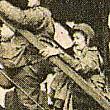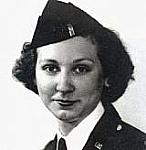Liberation of Nordhausen Concentration Camp
On April 12, 1945, their platoon was the first medical unit on the scene of the gruesome German death camp, Nordhausen, as it was being liberated. They found dead bodies stacked on top of each other like “cordwood”.
The nurses patched up the wounds of the living and helped where they could. Dysentery was a major problem as they attempted to feed the liberated prisoners. This particular prisoner of war camp did not have gas chambers, but instead held political prisoners. They weren’t fed enough to live on; if they could no longer work, they were left to starve.
The air hung with the odor of burning flesh from the crematoriums which were still burning when the platoon arrived. There were small white flakes in the air, much like a bonfire, but the smell was awful; one you never would forget. Her husband, Russ, was one of the first in to liberate Auschwitz. Later, they would talk to each other about these horrific experiences and that seemed to help.
“When Hitler finally surrendered on May 7, 1945, we were deep into Russian territory in Berlin,” said Joy. “We were afraid at first, being leery of the Russians, but no issues arose and when we left we turned the hospital over to them.”
The 51st stayed on for another 6 months as the war with Japan had not yet ended. Preparations were being made to get shipped there next. Fortunately, Japan surrendered on September 2, 1945. Their work of the 51st was completed and they boarded a ship for home.
Joy was discharged in November of 1945, earlier than her husband, Russ, as she had accumulated more military points. Points are earned for service time, bonus points are earned for overseas and active combat. Russ joined her at home in January 1946.
Source: The Nurse Who Went to War by Susan Harrison Wolffis, Muskegon Chronicle, March 31, 2002

 facebook
facebook




